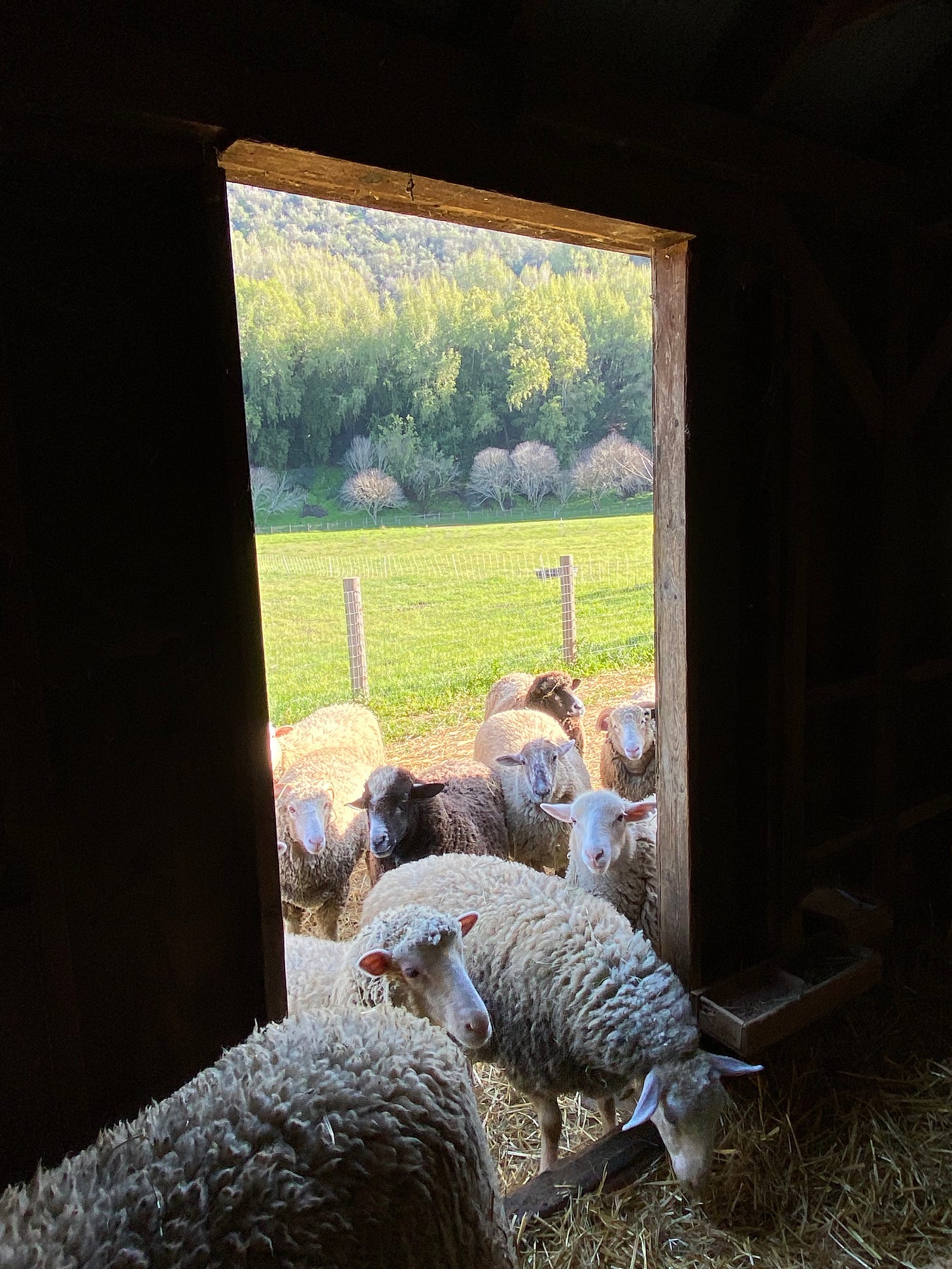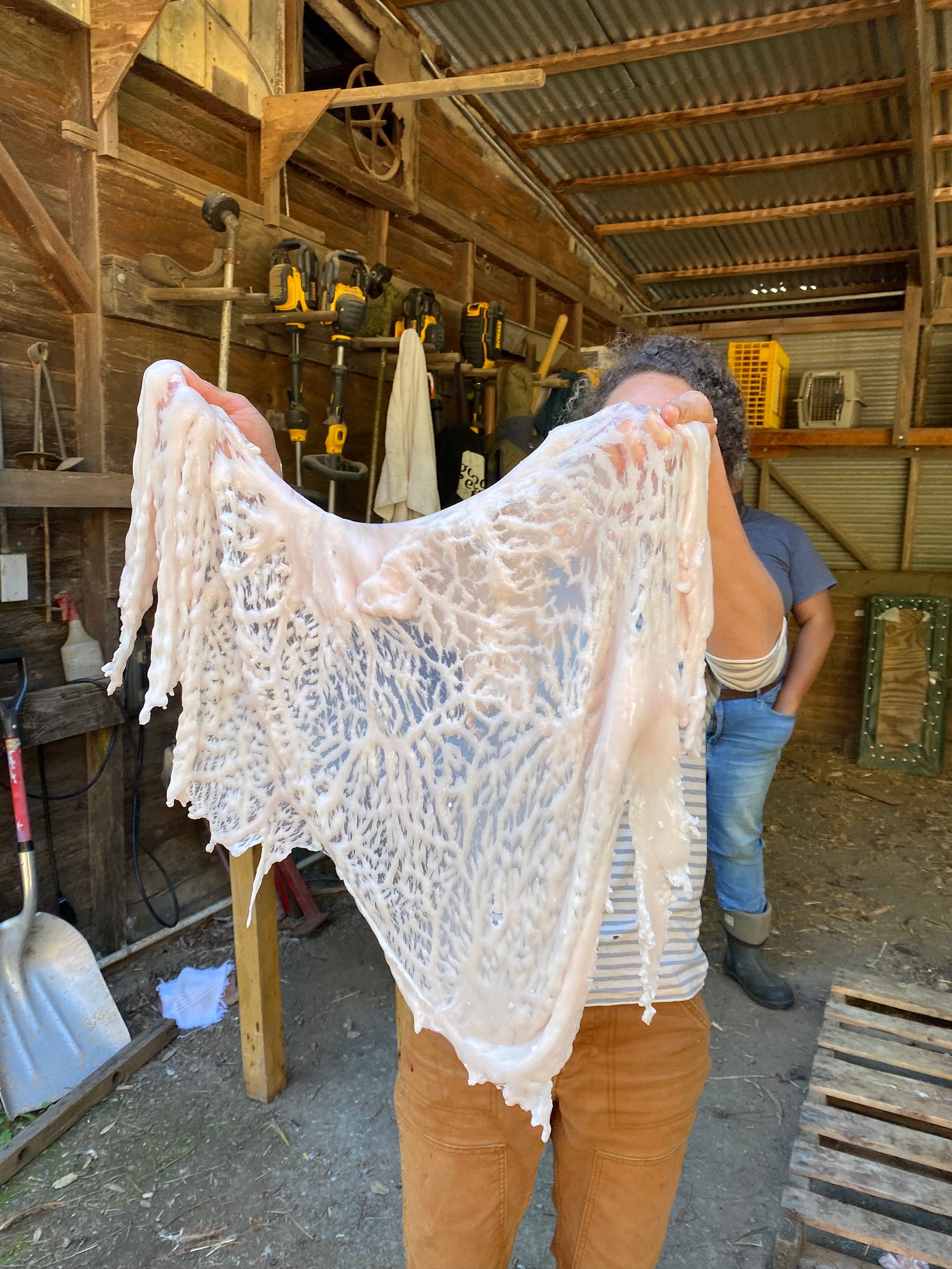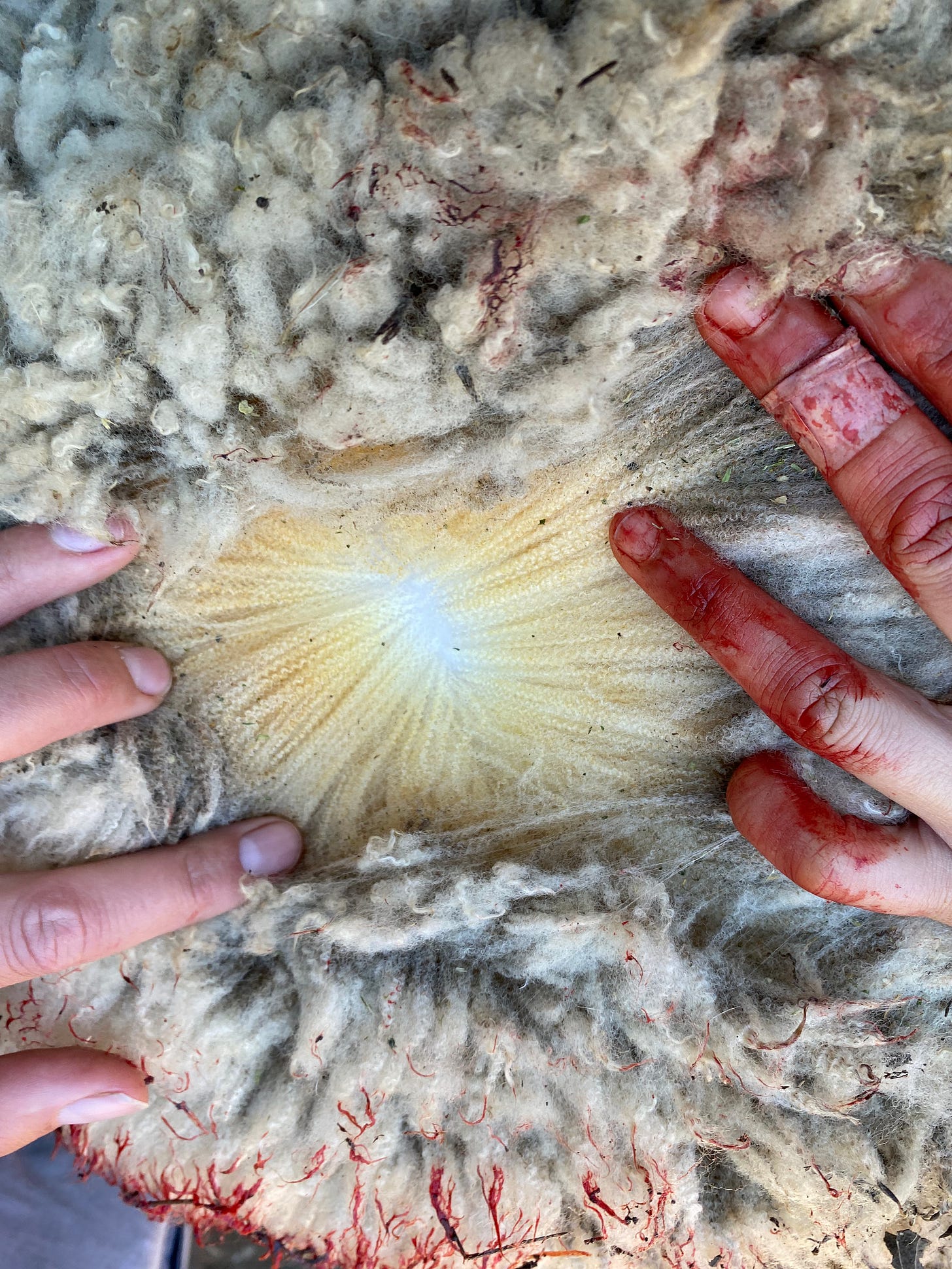SHEEP IN TRANSITION
(also land, people, organizations, and everything)
It’s been a week since I watched the life leave a sheep’s body.
As I’m settling into a routine in California, I’m aware that life is a ceaseless witnessing of transition—an organization in transition, land in transition, people in transition, a nation, an animal, a body, myself in transition.
The morning of the sheep slaughter, my skin felt thin and delicate. I’d woken up from a dream, breaking eye contact with a person who usually refuses to look at me when they appear in my midnight movies. I saw grief in their eyes and rose unable to tell if it was their’s or mine.
I drank my coffee as the sun spilled down the hills and into the valley. I texted a friend from back home like the unique details of our lives could form a bridge between us. Everyone I’ve ever loved felt impossibly far away. I felt a fading and, like my dream, couldn’t tell if it was me fading from their lives or them fading from mine. Even though I suspected this fading was only in my mind, I could feel my body acclimating to the familiar impossibility of being held.
I remembered how some of my friends are traveling in other countries, are on the road or sprinkled throughout the country. Coast to coast. I felt like a failing herding dog, wishing desperately to corral everyone into the same corner of the world so I could nip at their heels and know they were safe. So I could look at all the people I love at once.
Slowly the floors of our 162 year old house started to creak with footsteps of my fellow interns waking up. I’m living with six considerate and communicative people and we’re all existing comfortably. Our movements was cautious and the conversation limited as if we were paying respects to a life not yet lost.
On the dirt floor of an open-door shed just up the hill, a palette, darkened with the blood of last week’s ruminant harvest served as a gathering point for all those coming to take part and bear witness. The sun was shining and the morning was already warm enough to peel off my wool sweater.
(I’ve said the word wool so often lately that I’m getting targeted instagram ads for all sorts of wool products, slippers with goats on them. I guess that’s what happen when you talk about farm animals a lot.)
The sheep that we could hear baaaing from inside the truck had spent the last several weeks of its life out grazing in the fields. They are rotationally grazing the sheep (a method in regenerative agriculture) to ensure the health of numerous pastures without depleting their resources. It also allows for fertilization and promotes growth. Hidden Villa is constantly experimenting with ways to improve the quality of their soil, work in union with the animals, the seasons, the open green spaces.
Sheep waiting to be fed.
The soil that was tamped down by years of overcrowding horses on the land is being built back up with wood chips that the chickens and pigs are helping to break down and fertilize with their poop. Apparently last years eggplant harvest was the best the farm mangers have seen in 25 years because of this new wood chip method. I wish to someday know what it’s like to know a piece of land through 25 years of seasons. As we prepared to take a sheep’s life, I thought about how this animal had done its part in caring for the land simply by following its natural instincts.
With as much grace as you can hold a live sheep in your arms, two animal husbandry people held the sheep on her side—still, so the kill could be graceful. A small toot escaped as Natalie pressed her leg on the sheep’s side, to which she exclaimed ‘oh a little toot.’ A wisp of fear left me as I remembered humor could be present in death.
*CONTENT WARNING: I’m going to describe a sheep slaughter and a photo below has some fingers with blood on them*
The woman holding the knife, who wasn’t much larger than the sheep, said a shy but honest “thank you” before arranging the stun gun on the sheep’s skull. I didn’t envy her job with this audience but also felt curious about how it would feel to be the person holding the knife.
The literal action of sawing the knife happened so fast. Dying isn’t actually about the moment of death. It’s about the sometimes daunting task of honoring the meaning and purpose of the life. It’s about processing how we are all connected to the sheep.
The man with blood on his boots held the sheep’s head back at an unnatural angle to drain the blood; an act easier to watch than the death throes. Like a ‘chicken with its head cut off,’ the sheep’s legs kick involuntarily like it’s running horizontal. This was the only part that made the dam in my thick throat threaten to break.
If I had cried then, I would’ve cried for a reason I often cry. Uncertainty, confusion, having a feeling without a name. When the animal was a dead animal, I willed my throat to release. I refused to allow leftover dream grief to pull me out of the presence that I believe the sheep’s life deserved from me.
A brittle laugh cut through our collective trance and made the act of harvest feel human again. What it felt like before, I’m not sure I have a word for. It was not godly, but it felt bigger than any one of us could hold alone. The shakiness in her voice sharply contrasted the smooth movement of her knife.
‘There’s always such an adrenaline rush when I have to do this,’ she said and it made us all relax.
We were comforted by seeing she did not take killing an animal any lighter after doing it numerous times, that she, like all of us, was affected.
Commotion gave way to unified calm as the animal husbandry team got to work skinning. The blood on the ground was candy apple red and I never saw it turn brown. The inside of the sheep was white white. No blood. Except for some small fireworks of capillaries visible on the skin as it slowly was cut from muscle. The knives running softly between skin and muscle sounded like tissue paper sliding over itself.
As soon as the sheep was hung upside down from a tractor, it was no longer the sentient, skittish sheep we’d fed alfalfa and tucked into the barn at night. It became the reality of a working animal and it became the work of a farmer. Some people began talking about how delicious the meat would be.
I thought about how humans work for the many things animals provide us with clear intention because we deem them worth working for. Delicious meat we can trust, wool for scarves and sweaters, lanolin (the oil in sheep wool that makes them waterproof) that I’ve heard breastfeeding people rub on chapped nipples.
To finish removing the hide, you must reach an arm down into a ‘pocket’ in the sheep’s body cavity and use a fist to ‘punch out’ around the sheep’s back. So much of the vocabulary for slaughter and skinning is violent. Death throes, punching out—but the act didn’t feel violent.
I was invited to reach my hand into the sheep’s body. So I rolled up my sleeves, washed my hands and reached in, sliding my knuckles in the crevice where the hide became the muscle. Still warm, it felt like a return, like deja vu. Holding my arm out, I rubbed the sheep’s fat into my skin, I have never felt so clean. A strange but oddly comforting urge to cover my skin in the sheep’s moisturizing fat consumed my sensory imagination for a brief moment as I voiced this aloud. No one thought it was weird.
Holding the thick skin of the sheep in my hand, I thought of nothing but the sheep’s skin, of how much I would treasure anything made out of it. The muscles it exposed were blue, black, and purple; dusty like the underside of a butterfly’s wing.
Since being on the farm, I feel my empathy increasing. I feel myself being changed in a way that doesn’t yet know words. I am energized by my weekend farm chores, by waking early and feeding the animals while the compost piles are still steaming in the morning chill.
The textures of the sheep’s body—the balloony rumen, the slick warm liver, the handful of flesh where skin met wool—only made my love for the animals feel more inevitable.
I do not feel more hesitant to eat meat. In fact the opposite. I feel excited to consume an animal I can be confident was raised with integrity. Taking kids into animal pens, reminding them how to respect these non-human, sentient creatures; I am more aware than ever of the animal’s bodies, the autonomy they do and do not possess over themselves.
The sheep transformed again when the head came off. It seemed like the sheep’s soul was severed from the functionality of its body parts.
Caul fat: the fat that surrounds the inner organs of animals like cows, sheep, and pigs. It’s real good for cooking.
Soft, soft sheep wool and some bloody fingers.
At the end of each day I am exhausted. I am exhausted with from advocating for the youth who visit Hidden Villa, the safety of the animals, my own growth and well-being. The power embedded in the responsibility of outdoor education (and education in general), of being a facilitator for children’s formative experiences in nature, sometimes makes me choke up while I’m trying to talk in a debrief. Whether I’m talking about a girl crying and saying she hates the forest or a kid who got over his fear and touched a chicken for the first time, the responsibility is the same. I don’t know yet if I’m afraid of success of failure but the fact that the role I’m in has the potential to change of the course of a lifetime is not lost on me.
We will not save something that we do not love. (I’m sorry but can’t remember where I I heard this) Therefore helping people to fall in love with nature impacts not only their lives but the health of our planet.
Sometimes this feels like too much and other times it feels like all there is.
The other interns and I are constantly debriefing, using our voices to express concern with the ways of old volunteers, advocate for a more varied schedule that would allow us time in the dirt.
This is not my home. I am amazed by how I can feel so untethered to anything in the universe and simultaneously grounded in myself.
Emotions are high. I don’t know if this is where I want to be and this organization is far from perfect, but I’m learning every day and the sun is kind.
We teach the kids to thank the animals for what they give us. Thank you sheep. Thank you.
Thanks everyone for reading. The clarity I felt in the direct aftermath of the decision to drive across the country has disappeared into the complexity of group dynamics, new skills, a new landscape, and constant concerns of accountability and integrity, honesty and authenticity.
The urge to hide my uglier or unformed thoughts is alive and well but I’m combatting it with vulnerable conversations with my new friends and these letters for all of you.
That’s all I’ve got for now. Until next time. Take care.




